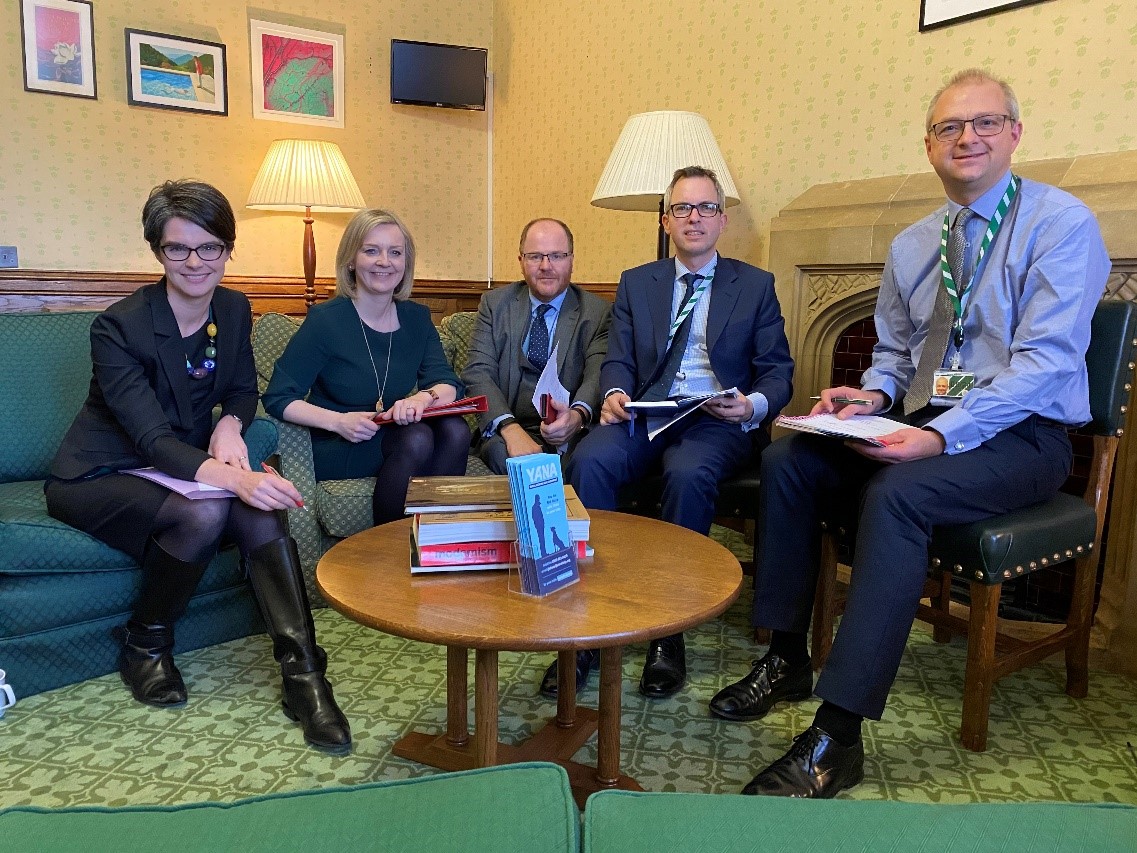
I was pleased to meet with fellow Norfolk MPs last week to discuss a range of Norfolk-specific issues, including with two new Norfolk Conservative MPs – James Wild and Jerome Mayhew.
A number of issues were discussed, including: health and social care, education, digital connectivity, access to GP and mental health services, amongst others.
The new Government has rightly made improving connectivity to help “level up” areas left behind a top priority. That isn’t just a problem in the North: Norfolk has many “left behind” areas and improving our bus, train, road and digital connectivity is vital to public services and widening access to economic opportunities in our marginalised communities. I was therefore pleased we discussed important infrastructure and transport issues such as the A47, bus provision, Ely rail junction, Norwich in Ninety and half hourly train services.
Norfolk’s Conservative MPs have a good track-record of working together to achieve for Norfolk, and I am delighted the group has now risen to 8 following the gain by Duncan Baker MP in North Norfolk.
As a group, we are keen to ensure that the county has a prominent place at the table in any future government spending rounds to ensure that the region is not left behind, and to champion all that is great in Norfolk.
I look forward to working with the group going forward to ensure that Norfolk continues to thrive!
You can read the article in the EDP here.
There were a lot of entries of an extremely high standard to the 2019 Mid Norfolk Parliamentary Christmas Card Design competition, and I am especially delighted to announce that the winner was Ella, aged 8 of Wicklewood Primary School, with her design: ‘A Merry Norfolk Christmas’.
The standard of entries reflects the hard work put in by all pupils and, of course, the inspiration of their teachers across our area.
As the winner, Ella’s entry was featured as the main image on my 2019 Christmas E-Card and will receive the prize of Afternoon Tea with me in Parliament, and a personal tour of the Palace of Westminster.
I also chose 3 highly commended entries who will each receive a £10 book token to be redeemed at Wymondham’s Kett’s Books.
You can view the winning design, ‘A Merry Norfolk Christmas’, and the highly commended entries below:
Winning Entry

Highly Commended

It is no secret that I have deep concerns about the high number of applications in our part of Norfolk – many of which are, often, highly inappropriate and on a scale that is unsustainable and out of keeping with the heritage and identity of our largely rural area, clearly breaching the sustainable development criteria set out in the National Planning Policy Framework and 2011 Localism Act.
That’s why I am pleased to hear that, on Monday, Breckland Council’s Planning Committee refused permission for the deferred application for 255 homes on land east of Yaxham Road/south of Dumpling Green in Dereham.
While I agree with the principle of ‘development’ (what society or civilisation has flourished without it?), I believe that any new development should be appropriate to the area in question – accompanied by the infrastructure and services necessary to support it. The answer isn’t to allow aggressive out of town developers to simply dump massive housing estates on rural communities like ours. We require a more local and organic approach to deliver vibrant villages and thriving towns – tailored to the needs of local people already living in them, and sufficiently ready to welcome those looking to join them. (It is for this reason that I set up The Norfolk Way back in 2007 – a not for profit campaign championing smaller pockets of local housing for local people, small businesses back in the countryside and better connectivity).
Due to serious concerns that this application threatened to undermine public trust in our planning system and would exacerbate Dereham’s pre-existing problems with traffic congestion, I wrote to Breckland Council last summer to support widespread local concerns about the proposals. (To read more about this, click to read my previous update here).
I am reassured that, having deferred the application at that time to allow for more work to be carried out, councillors on the Planning Committee have recognised that the basis for those concerns remain and how now decided therefore not to allow it to go ahead. (To read more about the decision, click here to see the recent Dereham Times article).
This all reaffirms the need for a proper strategic Dereham Town Plan and I remain committed to supporting Dereham Town Council, along with all the other groups involved, as they look to bring one about. As part of that, I am also determined to continue working with local councillors and agencies in order to try and bring about a proper solution to the terrible traffic problems that plague parts of the town – especially at the Tavern Lane/Yaxham Road Junction.
It was great to be back in Wymondham for another constituency Friday after a long week in Westminster last week.
A joy to hear the common sense of voters in Mid Norfolk going about their everyday lives: who want us to get on and deliver a sensible pro-jobs Brexit & One Nation Conservatives Government.
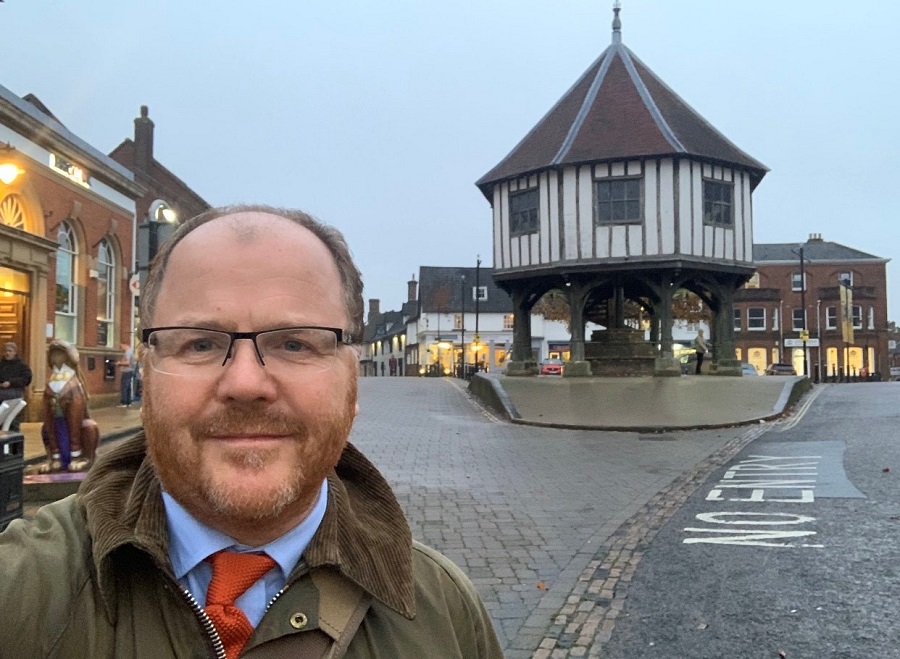
George Freeman responds to a debate on bus passes for women born in the 1950s who are affected by the pension changes.
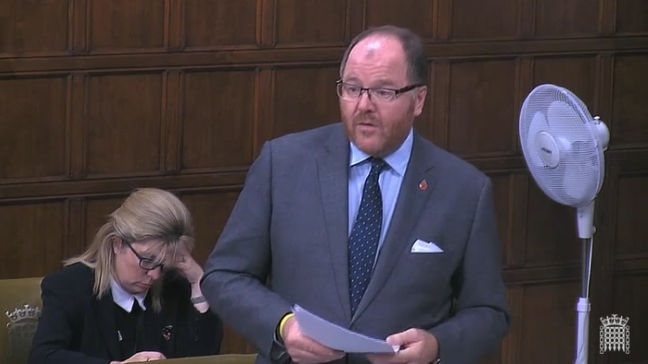
The Minister of State, Department for Transport (George Freeman)
Thank you, Sir Christopher, for the chance to serve under your chairmanship. I echo your justifiably warm comments about the hon. Member for Coventry South (Mr Cunningham). It is a pleasure for me to make my first appearance as the newly created Minister for the Future of Transport, but it is also a real pleasure to pay tribute to the hon. Gentleman. In my 10 years here, I have seen the quality, calibre and tenacity of the representation that he has given to the people of Coventry South. I am aware that this may be his last debate. He has given 50 years of public service, including as a city councillor leading the council and as an MP since 1992. Whoever returns in December, this House will miss the hon. Gentleman for his contributions.
My constituency is affected by the pension changes. It defies the stereotype of Norfolk as the playground for the golden Range Rovers from Chelsea to go to the coast. Mid Norfolk is a low-income, largely blue-collar, rural constituency. I well appreciate and understand the issues that the hon. Gentleman has raised, and the importance of concessionary fares on public transport and these pension reforms.
I want to set the scene by reminding everyone why these reforms were necessary. First, they reflected changes in average life expectancy. When the pension system was created, life expectancy was decades younger than today, when it is going up by about a year every decade. These are substantial changes to our workplaces and in the demography of our nation.
Changing the state pension age was a difficult but, in my view, necessary decision. It was necessary not least because we had to deal, in 2010, as a coalition Government, with the horrendous Budget deficit that we inherited. To remind those who are not familiar, the Government at the time were borrowing £1 of every £4 they were spending. Some very tough decisions had to be made. It is worth remembering that these changes were part of recognising some incredible and welcome changes in the workplace of modern Britain. Women now rightly enjoy—it is long overdue—the chance to fulfil careers based on equality in the workplace and to work long, healthy lives, and to enjoy the opportunities that have been dominated by men for too long. That is part of what the reforms were about. However, I totally accept, as I have with my constituents, that where there is a change or threshold in any benefit, concessionary travel or pension situation, there will be people who are caught at the margins or the cut-off point. That is what has happened in this case.
I would not be doing my job if I did not point out that women who reached the state pension age in 2016 will have received, on average, more state pension over their lifetime than women ever have before. Furthermore, if we had not equalised the state pension age, women would be expected to spend on average more than 40% of their adult lives in forced retirement. There are two sides to this coin.
On the suddenness of the change, although many women in my constituency were surprised in 2010-11—as I am sure they were in the hon. Gentleman’s—the changes have been coming. The Pensions Act 1995 included plans to increase the women’s state pension age from 60 to 65, to align with men. The Pensions Act 2011 moved the state pension age for both men and women to 66. As he signalled, the High Court ruled in favour of the Government in its judicial review ruling of 3 October.
Mr Jim Cunningham
I would need to check it out, but I understand that there may be an appeal on that ruling, so I do not think that the matter is finished.
George Freeman
There may well be an appeal, but I obviously cannot comment on it. I simply make the point that the appeal will be against the ruling in favour of the Government.
On concessionary travel, we all know that for many people the concessionary bus pass can be an absolute lifeline, providing access to work, public services, healthcare, education and, particularly in rural areas, to the very fabric of community and the fabric of active and healthy societies. That is why the Government continue to support concessionary bus travel to the tune of £1 billion a year through local authorities in the UK, to try and ensure that no older or disabled person in England is prevented from travelling by bus for reasons of cost alone. However, I accept that we must go further, and I will set out shortly what the Government will do.
Stephen Lloyd
As the Minister knows, one of the challenges with bus passes is that there is a bit of a postcode lottery: they vary between cities and rural areas. In the spirit of positivity that the Minister spoke about, will the Government make any proposals to ensure that people get the same level of bus pass across the piece, so that WASPI women in rural areas will not suffer more than they would if they lived in London?
George Freeman
The hon. Gentleman makes a very interesting point; will he drop me a line about it? As he knows, I am a champion for rural areas and tackling rural inequality, and I will be looking at what we need to do in our new bus package, which I will describe shortly, to ensure that rural areas do not suffer.
In April last year, we announced a change in the legislation to protect the concessionary travel scheme in its current form so that it can continue to provide free travel for eligible older and disabled people for years to come. I should point out that equalising the age difference between men and women removed the anomalous situation in which non-disabled citizens of working age received free bus passes.
To mitigate the effect of the state pension age changes on the people worst affected, Parliament has already legislated for a £1.1 billion compensation package, which reduced the proposed increase in state pension age for more than 450,000 of the hardest-hit men and women. That means that no woman will see her pension age change by more than 18 months relative to the 1995 Act timetable. I accept that that does not deal with all the issues that the hon. Member for Coventry South raised, but for me that is really important. Some of the constituents I have spoken to are among the most seriously affected, and the idea of the package is that it will help at least to substantially mitigate the impact on them.
In addition, the Government are committed to improving the outlook for older workers. We are helping many of the people who had planned to retire but now work, to get back into work, including by removing many of the barriers that they may face. To enable older people to work for longer, as many want to, we have reformed the legislation to remove the default retirement age, which means that people are no longer forced to retire at an arbitrary age. We have also extended the right to request flexible working to all with 26 weeks’ continuous employment, which means that people can propose and discuss a flexible working requirement to suit their needs.
Alongside those significant legislative reforms, we have been successfully challenging negative perceptions about older workers through a major programme, Fuller Working Lives, which is led by the Department for Work and Pensions. We have appointed Andy Briggs as the business champion for older workers, to spearhead the Government’s work to support employers in retaining, retraining and recruiting older workers, to actively promote the benefits of older workers to employers across England, and to influence them both strategically and with practical advice. I am not being pat when I point out that the hon. Member for Coventry South is a walking embodiment of the agility, impact and leadership that people can provide in their senior years. There are many people in this country who have a lot to give, in Parliament and in society, and we want to help and encourage them.
There is strong demand and competing claims for concessionary fares. There are many calls on the Government for extensions to the statutory concessionary bus travel scheme for important groups, including young people in search of work, jobseekers and carers, as well as those who are affected by the changes in the state pension age. Each of those groups may have a different and engaging case for access to cheaper travel, but if the Government are to protect the current scheme, which costs £1 billion a year, we must ensure that it is financially sustainable. With that in mind, I will shortly announce, as part of my reforms in my new role, a series of changes to the way in which we tackle demand-responsive bus travel in rural areas.
Concessionary travel legislation gives all local authorities in England the power to introduce local concessions in addition to their statutory obligations, so that authorities that have a particular problem can deal with it. I am delighted that that has happened in the west midlands, which includes the constituency of the hon. Member for Coventry South: the West Midlands Combined Authority, led by its excellent Mayor, Andy Street, has introduced a women’s concessionary travel scheme that gives free off-peak bus and tram travel to women who live in the west midlands and were born between March and November 1954. More than 9,000 women across the region are set to benefit. Lest anyone should think that I am being politically partial, let me say that a similar scheme has been put in place by Mayor Andy Burnham in Greater Manchester, and that schemes that offer free bus travel to residents aged 60 and over exist in London and Merseyside. Local leaders can, and in some cases do, put additional measures in place.
Luke Pollard
I am grateful that the Minister has set out the fact that that can happen, and that it is a good thing when it does. Has he considered carrying out a cost-benefit analysis, looking at the benefits to society from giving WASPI women the free bus pass that he so praises in the west midlands and in Manchester?
George Freeman
I am grateful for that excellent question. In my new role I am looking, not just at that issue, but at the costs and benefits of widening access to bus and public transport for people in areas where it can tackle disconnection and help to drive up productivity. In my constituency, and possibly in the hon. Gentleman’s, many communities are quite cut off and isolated from the very exciting areas that are creating jobs and have zero unemployment. Cambridge is 40 miles down the road from Mid Norfolk, but I have many constituents who cannot get there, so they cannot get those jobs. As part of my role, I am looking at the cost-benefit ratio for the Treasury of having better travel, better training and better skills.
The Government have committed to seriously transform bus services across the country for the first time in a generation. I therefore welcome, as I hope colleagues across the House will, the announcement of our £220 million package, “A better deal for bus users”. Whatever else one might think about politics in this country at the moment, I welcome the fact that we have a Mayor as Prime Minister—someone who not only gets buses, has designed them and paints them in his spare time, but deeply gets the importance of public transport and interconnected transport for modern connected places. That is, in no small part, why we are introducing our major bus reform, with £50 million to deliver Britain’s first all-electric-bus town or city; £30 million in extra bus funding, paid directly to local authorities to enable them to improve bus services and restore lost services; and £20 million to support demand-responsive services in rural and suburban areas.
On the point that the hon. Member for Plymouth, Sutton and Devonport (Luke Pollard) raised a moment ago, as Minister for the Future of Transport I am working actively on whether we can take a more intelligent place-based approach. When we look at a county—Norfolk, in my case—or a city, instead of asking how best to spend our money on subsidising bus services, we should ask a different question: “How best can we help the people in this area who need help to get to work or to get access to public services?” I am absolutely sure—indeed, I have seen it working—that by using digitalisation or simple telephone demand systems, we can make it easier for people to log on and signal where they need to go the next day, and we can ensure that we provide for a mixed economy. Whether it is for two or three people in a car-share, 10 people in a minivan, or 20 or 30 people on a bus, we can do much better in using technology to provide smarter public and community-based travel and support services.
I genuinely thank the hon. Member for Coventry South for raising this important matter, for the chance for us all, at the end of this Parliament, to signal that we need to get this right, and for allowing me to highlight what the Government are doing to get it right. As this Parliament winds up, I congratulate him on his very, very distinguished parliamentary career.
George Freeman responds to a Westminster Hall debate on rural bus services.
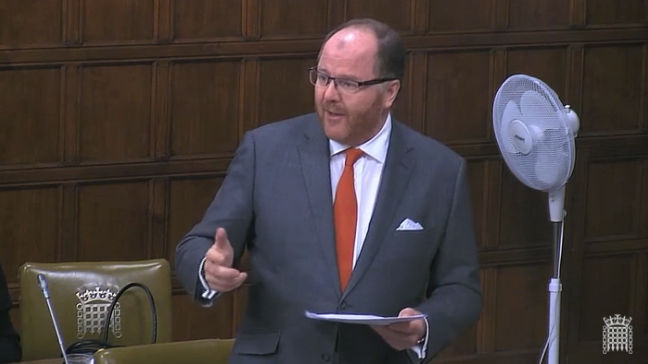
The Minister of State, Department for Transport (George Freeman)
Thank you for that, Dame Cheryl. I echo those sentiments and thanks.
I congratulate the hon. Member for Westmorland and Lonsdale (Tim Farron) on securing the debate and thank him for raising this issue. He now has a meeting in the diary with my noble Friend Baroness Vere, who leads on buses in the Department. It is an absolute pleasure for me to respond to the debate, partly because, as a rural MP for Mid Norfolk, I share many of the hon. Gentleman’s frustrations at the neglect of rural buses over decades, but also because, as the newly appointed Minister for the future of transport, with responsibility in the Department for a new portfolio and leading on tackling disconnection, decarbonisation, digitalisation and innovation in the private and public transport sectors, I welcome the chance to speak to the issues that he has raised and to highlight some of the things that we are doing to turbocharge the improvement of rural connectivity.
The hon. Gentleman and I, and indeed the hon. Member for Barnsley East (Stephanie Peacock), recognise, as I think all rural MPs do, that public transport and particularly buses in rural areas are essential to connectivity to the workplace, but also for access to public services, particularly healthcare and education. Often in these debates, however, those of us who bemoan the lack of investment and support for rural buses over the years forget that there is still a very substantial service. There are 4 billion bus journeys a year.
Buses remain the most popular form of public transport. Overall, passenger satisfaction remains consistently high, at 85%. I happen to think that the figures are probably higher in urban areas than in some of the rural areas, such as Mid Norfolk and Westmorland and Lonsdale. None the less, I place it on the record that buses are popular and are vital for the connectivity of rural communities and, of course, vital for productivity and general economic wellbeing. For the many people visiting areas such as the Lake district, buses are key.
For the first time in my memory, we have a Prime Minister who has been a Mayor—it is certainly the first time we have had a Prime Minister who makes model buses—and who actually has a passion for public transport, and for places, buses and connectivity, which is all to the good. It is for that reason that I am here today to signal the levelling up of our ambition for rural connectivity. Indeed, the first request that the Prime Minister made to me when he asked me to take on this role was to drive better innovation and faster connectivity, to reach out to those people and places left behind, which is a subject the hon. Member for Westmorland and Lonsdale and I have both spoken about and written on widely.
That is why I am delighted that in the last few weeks the Government have announced a new £220 million bus deal and committed to a long-term bus strategy. We may say that is long overdue, but it is happening none the less, and I am delighted. Crucially, it will focus on the passengers who rely on the services, rather than the providers, and we will also look at how national and local government, and the private and public sectors, can work together to improve value for money and to get a better deal from not only the additional money, but the money that we have already put in.
Each year the Department for Transport provides £250 million in direct revenue support for bus services in England via the bus service operators grant. Without that, fares would increase and marginal services would disappear in the hon. Gentleman’s constituency and mine. Around £43 million of that grant is paid directly to local authorities, rather than to bus operators, to support socially necessary bus services in their areas that are not commercially viable. The Government recognise the importance of these services, which are essential for rural connectivity and for supplementing the often patchy private provision of, for example, evening or Sunday services, which may not be available.
To improve current bus services or to restore lost services, the Government will pay an extra £30 million of new funding to local authorities to help tackle that problem, in addition to the £1 billion a year currently spent by local authorities on concessionary bus passes. We also committed to protecting the national bus travel concession, which benefits around 10 million people, allowing free, off-peak local travel anywhere in England. That concession provides older and disabled people with greater freedom, independence and a lifeline to their community, and enables access to facilities in their local area and helps them to keep in touch with family and friends.
In policy making, it is sometimes easy to overlook the essential nature of rural public transport for basic, functioning communities and connectivity. Living in a great city such as London during the week, one sees transport at our fingertips, on demand when we want it. In rural areas such as the hon. Gentleman’s and mine, it is not like that. No one expects it to be identical—we want diversity—but we have to recognise that connectivity is fundamental to a functioning society and economy. That is why we are going further and why we need to be more innovative.
Digitalisation and basic telephony now make a whole range of new services possible. Demand-responsive transport services have been used for some time to replace infrequent traditional services that do not meet a local community’s specific needs, or to get services closer to where people live at a time that is convenient for them—and we are about to go further and faster. We will start to look at places, counties and districts and ask where the people who most need to be moved around actually are, and at what time of day, and whether one bus running infrequently down one road is the right way to do that. Could we use technology to provide a more mixed package of lift-share, car-share, community bus and traditional and modern bus services?
To trial on-demand services in rural and suburban areas, the Government have established a new £20 million fund as part of that bus deal. I am delighted to tell the hon. Member for Westmorland and Lonsdale that, as part of that, I will be championing innovation in rural areas. As part of the future mobility zones that I am putting in place, we will look specifically at rural mobility, not just at inner-city and urban mobility, where so much of the innovation has tended to be.
The hon. Gentleman rightly paid tribute to the many people up and down rural Britain who contribute to community transport and support their communities. I echo that. Approximately 8 million passenger trips take place in rural areas every year, which has a huge impact on encouraging growth and reducing isolation. Community transport operators can access the bus service operators grant to help keep fares down and to run a wider network of services than they could otherwise afford to run. Community transport spend from this grant was substantially above £3 million in 2018-19.
Data, technology and innovation are making possible a whole range of new services, which is why access to digitalisation for rural bus services is a crucial part of what we are doing next. Passengers rightly expect easy access to comprehensive and high-quality information about local bus services. People want to know where they can catch a bus, when it will come, what the fare will be and how they can pay. With more and more people having smartphones in their pockets, it is surely possible for us to run a more digital and demand-responsive service.
The bus data powers in the Bus Services Act 2017 will go further than the partnership provisions, requiring all bus operators of local services in England to open up real-time information on routes, timetables, fares and tickets to passengers from next year. These improvements aim to remove uncertainty in bus journeys, improve journey planning and help passengers secure best-value tickets.
However, we will go further. Notwithstanding potential electoral disruptions, I shortly expect to announce future mobility zones, our flagship project for supporting innovation in future transport. Crucially, I will be looking at rural as well as urban areas. We will look at pilots on demand-responsive services such as those in Lincolnshire and in the Tees Valley, which was announced this week by the Mayor of Teesside, Ben Houchen.
I will close by congratulating the hon. Member for Westmorland and Lonsdale and genuinely thanking him for securing the debate, which has given us the chance to raise these issues. His points on the northern powerhouse were well made, and I will pass those on to the Minister responsible. The truth is that there is no single solution, and we should not seek some magic bullet. He is right to highlight that rural areas demand a different solution from urban areas. Equally, he is right to highlight that while cities such Manchester—the heartbeat of the northern powerhouse—are growing and investing, we need to look at nearby rural areas, to make sure that we are not creating a two-tier transport system.
The commitment from the Government and myself is clear: to maintain and improve local public transport. We also commit to go further, using this £200 million bus package to improve and support innovation in rural public transport, so that we have a mixed economy that works for the benefit of communities and businesses in rural areas. The Government are 100% committed to that. The Prime Minister is committed to that. I hope that we get a chance after the next election to put that into practice.
I was so thrilled with the designs from last year’s Christmas Card Competition, that I have written to local primary schools again this year to ask for the help of talented youngsters to design my new Christmas card.
The competition is open to all children at primary schools in Mid Norfolk and the winning design and two runners-up will appear on the front and reverse of the 2019 Christmas Cards. I’m offering the winner an invitation to join me for a tour of Parliament and tea on the Terrace of the House of Commons with three other guests of their choice. The two runners-up will be awarded a £10 book token. Hopefully we might be able, in a small way, to help inspire some budding artists (and democrats!) in the next generation. The process is very simple – as set out below:
* Each school to send in their pupils’ designs (in one ‘pack’ please) no later than Friday 22nd November (I’m afraid Christmas card logistics mean late entries can’t be considered).
* ‘Packs’ may be sent in by post to : 8 Damgate Street, Wymondham, NR18 0BQ or scanned and emailed to: george.freeman.mp@parliament.uk
* The card itself must be hand drawn on a blank white A4 piece of paper/card.
* Every entry must have the child’s name, age, school name and card title carefully written on the back of the card design.
I do hope you will feel able to support the idea. If you have any queries please do not hesitate to get in touch with me or Elliot King in my Wymondham office on 01953 600617.
Winning design from 2018:


George Freeman MP answers MPs’ questions to the Department for Transport.
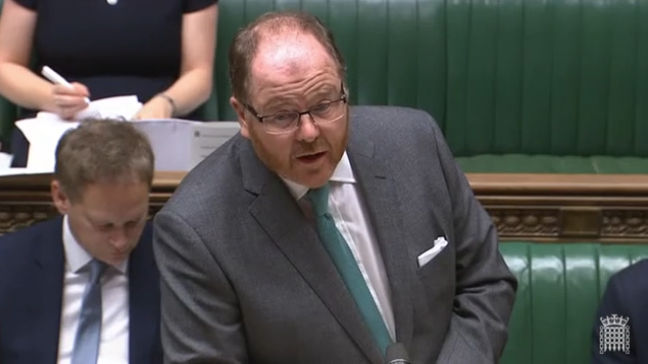
Driver and Vehicle Standards Agency: Industrial Action
Alex Norris (Nottingham North) (Lab/Co-op)
2. What recent discussions he has had with the Driver and Vehicle Standards Agency on industrial action by its staff. [900109]
The Minister of State, Department for Transport (George Freeman)
May I say, Mr Speaker, what a pleasure it is to be back under your chairmanship in this new role as Minister of State for the future of transport?
On 7 October, the Driver and Vehicle Standards Agency entered into talks with the Public and Commercial Services Union. They have met three times. The DVSA is expecting to continue the talks, which are supported by ACAS, at the start of November.
Alex Norris
On 30 August, I met DVSA employees in Nottingham who are taking industrial action, as they want to work in an environment free from bullying and where they are listened to and valued. My hon. Friends the Members for Gedling (Vernon Coaker) and for Nottingham South (Lilian Greenwood) and I wrote to Baroness Vere of Norbiton requesting a meeting to make these representations. She declined. Will the Minister or the Secretary of State take that meeting instead, so that they can hear important feedback from critical members of staff?
George Freeman
For the benefit of the House, I should say we are talking about the modernised employment contract for DVSA staff. This is a matter between the DVSA and staff. The impact will be two hours extra a week for training, which increases the working hours from 35 to 37. Lunch breaks are being protected. We very much hope that the union returns to the negotiations with the DVSA. I might perhaps gently ask the Labour party, which is reliant on the unions, to exercise their good influence on behalf of the travelling public.
Transport Infrastructure: London Region
Andrew Rosindell (Romford) (Con)
10. What plans his Department has to construct new transport infra- structure to serve growing towns on the outskirts of London. [900117]
The Minister of State, Department for Transport (George Freeman)
Transport in the Greater London area is devolved to the Mayor and delivered on his behalf by TfL. The Department continues to fund investment in major transport projects benefiting London, such as Crossrail and the Thameslink upgrade. The Department is also working with the Ministry of Housing, Communities and Local Government to plan transport infrastructure as part of sustainable house building, particularly through the housing infrastructure fund and the garden communities programme.
Andrew Rosindell
I thank the Minister for his response, but has he looked into the possibility of expanding his investment programme to the Gallows Corner area of my constituency—a major hub from Essex into London? Its 50-year-old structure now needs to be replaced. Is it not time that the Government stepped in to make sure that this happens?
George Freeman
I am delighted to confirm that we are indeed stepping in. My hon. Friend is a dogged advocate of the needs of Romford and, along with his companion Buster, has done more than anyone to put this subject on the map. I know that as well as Brexit he wants “Hexit”—he wants control of Havering taken back into Essex. However, I can confirm that we are looking at this scheme with TfL to develop a series of major structural renewals at Gallows Corner, as announced by the Government in October 2018.
Janet Daby (Lewisham East) (Lab)
I am pleased that last week, TfL launched its new consultation on the Bakerloo Line extension. Will the Minister commit to exploring funding options for that scheme with HM Treasury and TfL?
George Freeman
Those conversations are ongoing, and I am aware that the hon. Lady met the Rail Minister last week.
Several hon. Members rose—
Mr Speaker
On the grounds that Thurrock is somewhat more geographically deserving than Truro and Falmouth in respect of this question, I call Jackie Doyle-Price.
Jackie Doyle-Price (Thurrock) (Con)
Plans to deliver 3,000 new homes in Purfleet in my constituency have ground to a halt following Highways England’s decision to reject any planning application for more than 250 houses due to pressure on the A13. I find it difficult to explain to my constituents why Highways England is putting a new motorway through Thurrock while preventing us from planning and delivering new homes. Will the Minister meet me to discuss the matter?
George Freeman
Yes, I would be delighted to meet my hon. Friend. She will be pleased to know that the Secretary of State for Housing, Communities and Local Government and the Department for Transport are working on the much closer integration of housing and transport.
Damian Green (Ashford) (Con)
High Speed 1 is one of the most successful pieces of infrastructure at enabling commuting into London. Indeed, it is so successful and reliable that many services, particularly at peak hours, are massively overcrowded. In the Department’s radical look at the future of the rail network, will Ministers consider the provision of extra rolling stock on HS1, so that my constituents in Ashford and people in other places along the lines can have more comfortable journeys to and from work?
George Freeman
My right hon. Friend makes a typically excellent point, and I am delighted to confirm that the Rail Minister met the relevant decision makers yesterday to discuss that proposal.
Road Vehicles Lighting Regulations 1989
Tracey Crouch (Chatham and Aylesford) (Con)
11. Whether he plans to review the Road Vehicles Lighting Regulations 1989. [900118]
The Minister of State, Department for Transport (George Freeman)
On 23 July 2019, the Government announced a review of the available evidence to see whether a more flexible approach to the regulations permitting the use of red flashing lights by road recovery operators may be appropriate. The Department is in the process of commissioning the study, and a decision to review the regulations will be taken once the study has reported.
Tracey Crouch
I am grateful for that response. The partner of my constituent Sam was killed while recovering a vehicle on the M25. Since then, she and others have been campaigning for the roadside recovery industry to be able to use red lights, rather than amber, during recoveries. The police and others have now dropped their objections, and the science shows a difference in reactions to amber light and red light, so will the Minister now give the green light to the change?
George Freeman
I congratulate my hon. Friend on her campaign, and the whole House sends its condolences to her constituent. Our motorways are actually the safest roads, but she raises an important point. If the public feel that the use of red lights will help them feel safer, we will be minded, after looking at the evidence, to approve the change.
Sarah Champion (Rotherham) (Lab)
My constituent Jason Mercer is dead because of the Government’s ill-conceived all-lane-running scheme on the M1. Will the Minister please meet me and Claire Mercer, Jason’s widow, to discuss the safety implications of the scheme and the stopping of next year’s roll-out?
George Freeman
Yes, I would be delighted to meet the hon. Lady, as will the Roads Minister, Baroness Vere. I am also delighted to confirm that the Secretary of State will be announcing a short review so that we can deal with that problem quickly.
Jim Shannon (Strangford) (DUP)
Many of my constituents have told me about car headlights that seem undipped or exceptionally bright. This is a slightly different issue from the one we are discussing, but will there be regulations to ensure that headlights do not have an impact upon vehicles coming the other way? These lights can cause accidents.
George Freeman
The hon. Gentleman makes a good point. We are going to take a quick look at the evidence and introduce a framework to ensure that people are safe on the edges of our motorways and that drivers know that the right regulations have been put in place for them.
Transport Infrastructure
Craig Tracey (North Warwickshire) (Con)
13. What steps he is taking to ensure that all regions have sufficient transport infrastructure to support economic growth. [900120]
Fiona Bruce (Congleton) (Con)
14. What steps he is taking to ensure that all regions have sufficient transport infrastructure to support economic growth. [900121]
Kevin Hollinrake (Thirsk and Malton) (Con)
17. What steps he is taking to ensure that all regions have sufficient transport infrastructure to support economic growth. [900125]
The Minister of State, Department for Transport (George Freeman)
Since 2015, we have doubled our capital investment in the transport system, and we are investing over £72 billion in transport infrastructure in the five years to 2020-21. The Prime Minister has set out his commitment to enhancing and levelling up connectivity across the country and, as such, we are investing an average of £248 per person in the north, compared with £236 per person in the south.
Craig Tracey
One of the main projects that has been identified as essential for future economic growth in the midlands is the A5 upgrade in north Warwickshire. Will the Minister commit to working with me, the A5 partnership and Midlands Connect to help deliver these vital improvements?
George Freeman
Yes. My hon. Friend makes an excellent point, and we are in discussions right now on that important golden triangle. We will shortly be announcing our plans for the A5 in the road investment strategy.
Fiona Bruce
Middlewich is clearly on the Government’s map for both road and rail investment, with £50 million for a bypass and funding for the business case for reopening the railway station. Will the Minister assure me that both projects are continuing at pace, and will he meet me to discuss it?
George Freeman
Yes, I am delighted to reassure my hon. Friend that we will make sure the pace is kept up and that the change in political control does not slow it down. We will make a decision on the final funding once a business case has been properly considered.
On the reinstatement of passenger rail services via Middlewich, my officials are now working with local partners on the development of that business case, which we will consider with Transport for the North.
Kevin Hollinrake
The A64, which runs through my constituency and the constituency of my right hon. Friend the Member for Scarborough and Whitby (Mr Goodwill), is desperately in need of dualling. Will the Minister answer the calls of all MPs, businesses, local authorities, residents and hundreds of thousands of tourists and commit to this very important project?
George Freeman
My hon. Friend has been a tireless campaigner for the A64, and I can assure him that his message, both today and in his various correspondence and meetings, has been heard loud and clear. We will shortly be announcing the second road investment strategy, as promised in the first. We have plans for the A64, so I urge him just to wait for a few weeks and months.
Thangam Debbonaire (Bristol West) (Lab)
For economic growth to be properly supported, transport infrastructure needs to be properly accessible, so will the Minister and the Government commit to making sure that every local railway station, such as Lawrence Hill and Stapleton Road in my constituency, is fully accessible?
George Freeman
The hon. Lady makes an excellent point—I have a railway station in my constituency that is in desperate need of disability access—and that is why we have launched the Access for All programme. We will be looking to make sure that all those stations with the most urgent access challenges are sorted in the right order.
Bill Esterson (Sefton Central) (Lab)
Buses are a very important part of transport infrastructure, and my constituents will benefit enormously from the announcement by the metro Mayor of the Liverpool city region, Steve Rotheram, of a new metrocard. When will we improve bus service integration across the country by ensuring that we have a single smartcard, not different cards in different parts of the country?
George Freeman
I note the omission of thanks for the major package of investment in bus infrastructure, and I simply make the point that the Mayor has those powers. I am leading the Department’s work on smart ticketing, and we are keen to see Transport for the North and the Mayor lead that programme so people in that area can have integrated ticketing.
Dan Jarvis (Barnsley Central) (Lab)
I am sure the Minister shares my frustration that rail passengers in the north will have to continue enduring the use of Pacer trains well into 2020, despite assurances from Northern that they would be taken out of service by the end of this year. Does he believe that passengers should be compensated as a result?
George Freeman
The Department shares the disappointment that the new rolling stock has been delayed. Pacer trains are not fit for purpose for the 21st century. Northern retired the first of its 102 Pacers in August, and it plans to remove two thirds by December 2019. Northern advises that, subject to receiving appropriate dispensation, up to 34 Pacers will remain in the fleet, but I assure the hon. Gentleman that we are determined to make sure the fleet is properly modernised.
Rachael Maskell (York Central) (Lab/Co-op)
Labour knows the true value of connecting towns and cities across the north. Our integrated transport plan will invest in public transport, in public ownership, to work for the passengers not the shareholders. We will start by investing £39 billion in the whole Crossrail for the north project. How much will the Minister commit to the project today? Only £15 billion?
George Freeman
I think the nation will be interested to hear the Opposition Front Bench team announcing major plans for investment, given that their economic plans will see a massive loss of investment in this country and massive economic damage. We can fund good transport infrastructure and a good NHS only when we have economic growth. The truth is that this Government are proceeding with the biggest investment package in road, rail and infrastructure in this country since the Victorians—£72 billion—and we are spending more per head on passengers in the north than in the south. This Government have the interests of the north at their heart.
Topical Questions
Vicky Ford (Chelmsford) (Con)
T9. The permanent closure of the Army and Navy flyover has created a transport emergency across Chelmsford and mid-Essex. Can the Minister confirm that officials from the Department for Transport are working at pace with Essex County Council and focusing every effort on developing, funding and delivering a long-term solution to this junction? [900141]
The Minister of State, Department for Transport (George Freeman)
I am delighted to say that the noble Baroness Vere who deals with these issues and I met yesterday, and we both commend my hon. Friend for her leadership on this issue. This has been a very serious emergency situation, causing huge congestion in her part of the world, and we are determined to ensure that we get the solution right. That means not necessarily rebuilding what was there before, but getting a proper state-of-the-art solution.
Andrew Jones (Harrogate and Knaresborough) (Con)
After a widely supported and successful campaign against a relief road in Harrogate, the transport authority is now looking at a package of sustainable measures to take transport forward in the area. What support will the Government provide to North Yorkshire County Council and other such councils developing sustainable transport packages?
George Freeman
My hon. Friend raises an excellent point. We are currently in the midst of talking to the Secretary of State for Housing, Communities and Local Government about a much more fundamental integration of housing and transport through the housing infrastructure fund. I will happily meet my hon. Friend to talk this through to make sure that it works for local places so that housing comes with proper transport.
